Spanish Needles, Spanish Needles Beggars Ticks - Bidens bipinnata
|
Bidens bipinnata - Spanish Needles, Spanish Needles Beggars Ticks. Bidens is a large genus of over 200 species found around the world. There is at least one Bidens species found in each of the United States. The name comes from the latin words for two teeth - in most Bidens species the seeds have two usually barbed awns at the end (although Bidens bipinnata usually has more than two.) These barbed awns allow the seeds to stick to hair, fur, and clothing, thus being distributed as far as the carrier may travel. The genus is closely related to Coreopsis, and classification changes will likely occur in the future.
Bidens bipinnata is one of the more widely distributed species in the genus, and is more tolerant of drier habitat than many other species in the genus. It is found in floodplains, fields, roadsides, gardens, and other disturbed areas throughout the eastern United States and in its southern range as far west as Arizona, south into Mexico. It may also be native to eastern Asia, and may be introduced in much of the rest of the world.
Found in:
AL, AR, AZ, CA, CO, CT, DC, DE, FL, GA, IA, IL, IN, KS, KY, LA, MA, MD, MO, MS, NC, NE, NJ, NM, NV, OH, OK, PA, RI, SC, TN, TX, VA, WV, GS
Leave comments on Bidens bipinnata at this link. | 
Distribution of Bidens bipinnata in the United States and Canada:

Blue=Native; Grey=Introduced
Map from USDA Plants Database:
USDA, NRCS. 2017. The PLANTS Database (http://plants.usda.gov, 08 May 2025). National Plant Data Team, Greensboro, NC 27401-4901 USA.
Search Our Database: Enter any portion of the Scientific, Common Name, or both.
Do a general Google search of the entire site:
#ad
 Follow USWildflowers on Twitter
#ad
| | Site: Walker County, GA Date: 2018-August-14 | Photographer: Gerald C. Williamson
Nikon D7000
Tamron SP 90MM f/2.8 AF Macro | | Bidens bipinnata has small flower heads, usually single but occasionally with multiple heads in a corymbiform array. There are usually either 0 or 3 to 8 yellow to off-white ray florets, although I have photographed one with a single ray floret (exceptions to every rule.) The ray florets are sterile. There are 10 to 20, sometimes more, disc florets with yellow to off-white corollas. The disc florets are fertile. | | 
| | Site: Walker County, GA Date: 2018-August-14 | Photographer: Gerald C Williamson
Nikon D7000 | | One of the characteristics of Bidens species is a calyculus of herbaceous bracts surrounding the phyllaries. In the case of Bidens bipinnata (and some other Bidens) the calyculus bracts are far exceed the phyllaries. The bracts are the same color as the foliage, while the phyllaries are yellowish with brown nerves. | | Click on the photo for a larger image
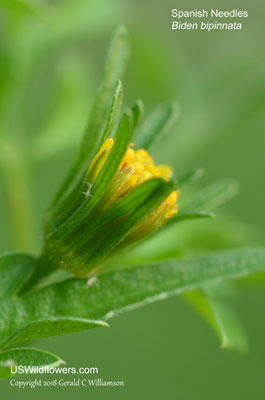
| | Site: Walker County, GA Date: 2018-August-14 | Photographer: Gerald C Williamson
Nikon D7000 | | The fertile ray florets develop the seeds, which are up to about .75 inches long, extended with 3 or 4 (sometimes only 2) barbed awns. These barbed awns allow the seeds to stick to hair, fur, and clothing. It is these seeds that give the plant its common name of "Spanish Needles." | | Click on the photo for a larger image
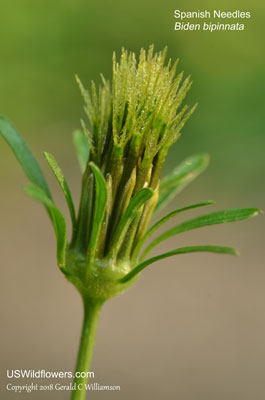
| | Site: Walker County, GA Date: 2018-August-26 | Photographer: Gerald C Williamson
Nikon D7000 | | The fertile ray florets develop the seeds, which are up to about .75 inches long, extended with 3 or 4 (sometimes only 2) barbed awns. These barbed awns allow the seeds to stick to hair, fur, and clothing. It is these seeds that give the plant its common name of "Spanish Needles." | | Click on the photo for a larger image
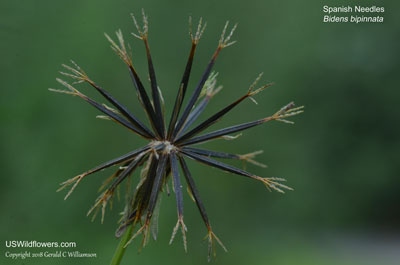
| | Site: Walker County, GA Date: 2018-August-14 | Photographer: Gerald C Williamson
Nikon D7000 | | Bidens bipinnata is a leafy plant (and I think attractive) with green to reddish green stems, growing up to 3 to 5 feet tall. The compound leaves are opposite on the stem. | | Click on the photo for a larger image
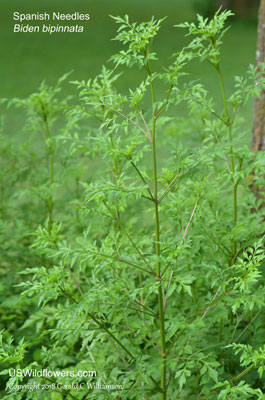
| | Site: Walker County, GA Date: 2018-August-14 | Photographer: Gerald C Williamson
Nikon D7000 | | The leaves of Bidens bipinnata a bipinnately compound, occasionally 1- or 3-pinnate. The margins of the ultimate lobes are entire, irregularly cleft, or toothed, and glabrous or nearly so. | | Click on the photo for a larger image
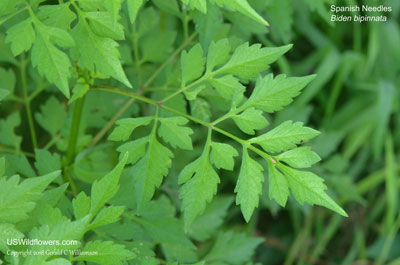
|
References used for identification and information:
|
|
| |
| #ad
|
|








